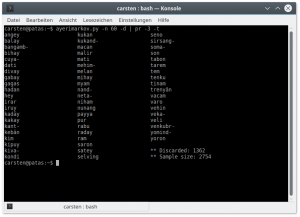Since I’m sometimes a little lazy to come up with new words, I wrote myself a little Python script which pulls a certain subset of words from the dictionary database I’m using and applies a Markov chain algorithm to it in order to generate new similar words. The script is sophisticated enough to filter out duplicates and some other undesirable outcomes. You can adapt the code shared below to your needs if you wish to.
Tag Archives: vocabulary
Translation Challenge: The Beginning of Tolstoy’s “Anna Karenina”
Text in English
The text to be translated in this Translation Challenge is the initial passage of Tolstoy’s 1878 novel Anna Karenina.[1. Hat tip to Steven Lytle for suggesting it.] The Ayeri translation here follows the English one by Constance Garnett (1901), which can be found on Project Gutenberg.
Happy families are all alike; every unhappy family is unhappy in its own way.
Everything was in confusion in the Oblonskys’ house. The wife had discovered that the husband was carrying on an intrigue with a French girl, who had been a governess in their family, and she had announced to her husband that she could not go on living in the same house with him. This position of affairs had now lasted three days, and not only the husband and wife themselves, but all the members of their family and household, were painfully conscious of it. Every person in the house felt that there was no sense in their living together, and that the stray people brought together by chance in any inn had more in common with one another than they, the members of the family and household of the Oblonskys. The wife did not leave her own room, the husband had not been at home for three days. The children ran wild all over the house; the English governess quarreled with the housekeeper, and wrote to a friend asking her to look out for a new situation for her; the man-cook had walked off the day before just at dinner time; the kitchen-maid, and the coachman had given warning. (Tolstoy 2013)
Ayeri translation
Kamayon pandahajang-hen mino; minarya miraneri sitang-ton pandahāng-hen minarya.Enyareng atauya kāryo nangaya pandahana Oblonski. Silvisaye sarisa envanang, ang manga miraya ayon yena cān-cānas layeri Kahani, seri ganvayās pandahaya ton, nay ang narisaye ayonyam yena, ang ming saylingoyye mitanyam nangaya kamo kayvo yāy. Eng manga yomāran eda-mineye luga bahisya kay, nay tong vakas ten pulengeri, sitang-tong-namoy ayonang nay envanang, nārya nasimayajang-hen pandahana nay nangānena ton naynay. Ang mayayo nyān-hen nangaya, ming tenubisoyrey, mitantong kadanya. Ang engyon vihyam miromānjas keynam si sa lancon kadanya apineri kondangaya, nasimayajas pandahana nay nangānena Oblonski. Ang saroyye envan sangalas yena, ang manga yomoyya ayon rangya ton luga bahisya kay. Sa senyon ganye nangaya-hen; ang ranye ganvaya Angli kayvo lomāyaya visam nay ang tahanye ledoyam, yam mya balangyeng pinyan yanoley gumo hiro ye; ang saraya ersaya bahisya sarisa pidimya tarika sirutayyānena; ang narisaton lomāya risang nay lantaya vapatanas ton.
More information
I also made a PDF containing interlinear glosses and commentary for this translation.[1. Also, please let me add that XƎTEX is pretty darn awesome.],[1. Updated with some corrections on Dec 11, 2014. See the diff on Github for changes.]
- Plank, Frans, Thomas Mayer, Tatsiana Mayorava and Elena Filimonova, eds. The Universals Archive. 1998–2009. U Konstanz, 2009. Web. 26 Oct. 2014. ‹http://typo.uni-konstanz.de/archive/intro›.
- Schachter, Paul. “The Subject in Philippine Languages: Topic, Actor, Actor-Topic, or None of the Above?” Subject and Topic. Ed. Charles N. Li. New York: Academic P, 1976. 493–518. Print.
- Tolstoy, Leo. Anna Karenina. Eds. David Brannan, David Widger and Andrew Sly. Trans. by Constance Garnett. Project Gutenberg. 11 Oct. 2014. Project Gutenberg, 22 Feb. 2013. Web. 26 Oct. 2014. ‹http://www.gutenberg.org/ebooks/1399›.
Translation Challenge: The Scientific Method
The other day, when I was reading io9, I came across an article about One of the World’s First Statements About the Scientific Method. The article is about a quote by Alhazen – Ibn al-Haytham, an Arab polymath of the 10th/11th cenutry –, the quotation from his book Doubts Concerning Ptolemy (Al-Shukūk ‛alā Baṭlamyūs). I don’t know how accurate the translation is, but I thought that it would still be nice as a Translation Challenge, so I’m basing the following translation off of this English translation, since I don’t know any Arabic. Unfortunately, there is no indication of the edition the translated passage is quoted from. According to a comment on the article by Bradley Steffens, the source of this quotation is the closing passage of his own book Ibn al-Haytham: First Scientist. Contrary to what Steffens says in the comment, however, there is a critical translation of Alhazen’s book into English by Don L. Voss, published in 1985 as a Ph.D. thesis at the University of Chicago, but it doesn’t seem to be easily available outside of UChicago. Since I don’t have access to either book, I’m quoting this from the io9 article:[1. I hope Mr. Steffens will excuse my lifting this passage from his book, here with proper attribution, though.]
The seeker after truth is not one who studies the writings of the ancients and, following his natural disposition, puts his trust in them, but rather the one who suspects his faith in them and questions what he gathers from them, the one who submits to argument and demonstration and not the sayings of human beings whose nature is fraught with all kinds of imperfection and deficiency. Thus the duty of the man who investigates the writings of scientists, if learning the truth is his goal, is to make himself an enemy of all that he reads, and, applying his mind to the core and margins of of its content, attack it from every side. [H]e should also suspect himself as he performs his critical examination of it, so that he may avoid falling into either prejudice or leniency.
What struck me as challenging here is that this rather lengthy quotation consists of just three sentences with both a complex structure and interesting vocabulary that exceeds that of daily language, e.g. seeker after truth, the ancients, natural disposition, deficiency, investigate, … However, since I don’t like too complex sentences in Ayeri, I split the three sentences in the quote up into multiple sentences, which makes translation a bit easier. The first sentence especially also lends itself well to using anaphora and parallelism as a stylistic device. The English text also does that, but obscures it a little by using a lot of coordinated clauses in a single sentence.
Seek truth -AGTZ -A NEG person -P REL PT.INAN study -3SG.M.A writing -PL -T ancient -NMLZ -GEN and trust -3SG.M.A nature -LOC 3SG.M.GEN according.to.[/gloss]
‘The truth-seeker is not a person who studies the writings of the ancient and trusts in them according to his nature.’
[gloss]Adanya -ang nāreng nyān -as si sa birenya -yāng paronān -Ø yana nay sa nikang -yāng adanya -Ø si sob -yāng ray.
That.one -A rather person -P REL PT doubt -3SG.M.A trust -T 3SG.M.GEN and PT question -3SG.M.A that.one -T REL learn -3SG.M.A 3PL.INAN.INS.[/gloss]
‘He is rather a person who doubts his trust and questions what he learns from them.’
[gloss]Adanya -ang māy nyān -as si ya sitang= avan -yāng mandan -Ø nay pukatan -Ø, nāroy narān -ya keynam -ena =nama si -Ø -nā suhing -ang tan deng miran -ye -ri =hen sempay -arya -na nay sinka -ye -na.
That.one -A AFF person -P REL LOCT self= subject -3SG.M.A argumentation -T and proof -T, but.not word -LOC people -GEN =mere REL -GEN -GEN nature -A 3PL.M.GEN full kind -PL -INS =all perfect -NEG -GEN and flaw -PL -GEN.[/gloss]
‘He is a person who subjects himself to argumentation and proof, but not to the word of mere humans the nature of which is full of all kinds of imperfections and flaws.’
[gloss]Dila -yam -an -ang kalam -ena bahalan -as ayon -ena si le nivisa -yāng tahang -ye -Ø sobisaya -ye -na, ruān -as yana kada, sa tav -yāng kehin -Ø enya -na si laya -yāng.
find.out -PTCP -NMLZ -A truth -GEN goal -P man -GEN REL PT.INAN investigate -3SG.M.A writing -GEN -T scholar -PL -GEN, duty -P 3SG.M.GEN thus, PT become -3SG.M.A enemy -T everything -GEN REL read -3SG.M.A.[/gloss]
‘If finding out the truth is the goal of the man who investigates the writings of the scholars, his duty is thus for him to become the enemy of everything he reads.’
[gloss]Na pakua -yāng tenuban -as yana terpeng -yam nay lito -yam erar -Ø nay ang kongr -ya ray -ena =hen.
GENT apply -3SG.M.A reason -P 3SG.M.GEN center -DAT and margin -DAT content -T and AT attack -3SG.M.A side -GEN =every.[/gloss]
‘He applies his reason to the center and the margin of the content and attacks it from every side.’
[gloss]Ang mya birenya -ya -Ø sitang= yās naynay ling nivisān -j -ya yana, kadāre ang mya manang -ya -Ø tav -yam kimbisan -as adun -ena soyang tataman -ena.
AT be.supposed.to doubt -3SG -T self= 3SG.M.P as.well during investigation -PL -LOC 3SG.M.GEN, so.that AT may avoid -3SG -T become -PTCP prey -P prejudice -GEN or leniency -GEN.[/gloss]
‘He is to doubt himself as well during his investigations so that he may avoid becoming the prey of prejudice or leniency.’
The whole text:
Balangkalamayāng voy nyānas si le sobisayāng tahangye timbayanyena nay paronayāng suhingya yana nasyam. Adanyāng nāreng nyānas si sa birenyayāng paronān yana nay sa nikangyāng adanya si sobyāng ray. Adanyāng māy nyānas si ya sitang-avanyāng mandan nay pukatan, nāroy narānya keynamena-nama sinā suhingang tan deng miranyeri-hen sempāryana nay sinkayena. Dilayamanang kalamena bahalanas ayonena si le nivisayāng tahangye sobisayayena, ruānas yana kada, sa tavyāng kehin enyana si layayāng. Na pakuayāng tenubanas yana terpengyam nay litoyam erar nay ang kongrya rayena-hen. Ang mya birenyaya sitang-yās naynay ling nivisānjya yana, kadāre ang mya manangya tavyam kimbisanas adunena soyang tatamanena.
- Newitz, Annalee. “One of the World’s First Statements About the Scientific Method.” io9. Gawker Media, 17 Apr. 2014. Web. 25 Apr. 2014. ‹http://io9.com/one-of-the-worlds-first-statements-about-the-scientific-1564545837›.
- Steffens, Bradley. Ibn al-Haytham: First Scientist. Greensboro: Morgan Reynolds, 2007. Print.
- Added pretty scriptie and recording; fixed some errors and redundancies both in translation and in wording.



![Background: “光绪皇帝大婚图.” [“Picture of the Wedding of Emperor Guangxu.”] Wikimedia Commons. (Published in the Public Domain; cropped and label added)](/wp-content/uploads/2012/02/imperial-messages-title.jpg)